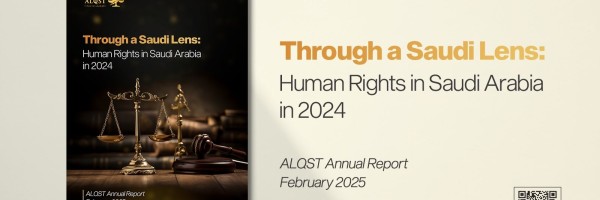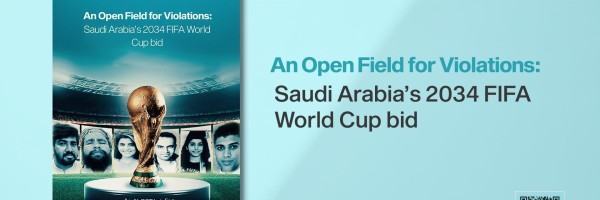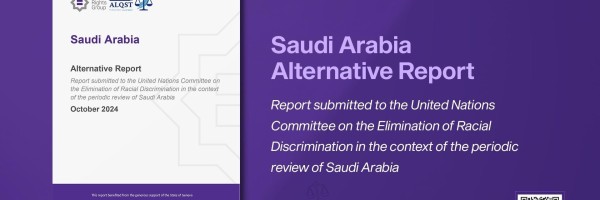A summary of the human rights situation in the Kingdom of Saudi Arabia for the first quarter of 2015.
Human rights are rights that are inherent to all human beings, whatever ones nationality, place of residence, sex, ethnic origin, religion, language or any other status is. They are interrelated, interdependent and indivisible and are all based on the notion of human dignity. They are guaranteed to us by law in the form of international, regional and national law, customary international law, general principals and other sources of law. What these laws do is place an obligation on governments to act in a particular manner and to refrain from certain acts that can impinge on an individual, or a group of individual’s fundamental freedoms.
The Kingdom of Saudi Arabia occupies a seat at the UN Human Rights Council. Despite this, and instead of the situation improving in the Kingdom, it has continuously deteriorated in recent years. It is deemed a country of concern by the Foreign and Commonwealth Office of the UK and the most recent Economist Democracy Index listed Saudi Arabia as the fifth most authoritarian government in the world. They have ranked lower than Iran, yet equal to Burma. It has one of the world’s worst records for executions.
From the 1st of January 2015 to the time of this report (21st April 2015), 63 individuals have been executed and from 1985 to 2015 over 2150 individuals were executed. This equates to an average of 1.4 executions per week. Saudi Arabia’s accessed to the Convention on the Elimination of All Forms of Discrimination against Women (CEDAW) in 2000, yet they continue to violate over 9 million women and their rights. Domestic violence against women and children has not received any legal enforcement as the government failed to pass legislation to criminalise it in 2011.
The World Economic Forum in 2013, in their Global Gender Gap Report ranked Saudi Arabia 11th lowest of 136 countries for gender inequality. Women are banned from using public services, accepting medical treatments and are forbidden to travel without their guardian amongst many other things. When female activist Loujain Hathloul and journalist Maysaa Alanoudi tried to defy the ban on women driving in December 2014, they were intersected and arrested at the border and imprisoned for 73 days. Their case has been transferred to the Specialised Criminal Court, set up to try cases of suspected terrorism and is still open. The numbers of prisoners of conscious has also steadily increased in recent years.
According to human rights organisations and activists, there are at present over 30,000 prisoners of conscience in the Kingdom, many of whom are held on terrorist related charges, languish hefty jail sentences and are subjected to unfair trials. The prosecutions brought against these prisoners of conscience lack the necessary principles of a fair trial as they do not abide by codified procedures and are often tried without a lawyer present. Torture is also widespread within the Kingdom and is often backed by the authorities to continue judicial impunity. Saudi Arabia signed the Convention against Torture and Other Cruel, Inhumane or Degrading Treatment or Punishment (CAT) in 1997.
CAT has been incorporated into Saudi national law and was accepted with a royal decree since 2001. Yet most judges in the Kingdom knowingly accept confessions from prisoners of conscience extracted through torture. Methods such as sleep deprivation, electric shocks, and the use of excessive force as well as physically and emotionally degrading prisoners are common practice.
When the Anti-Terrorism Law came into effect in February 2014, hopes for reform were effectively killed. Voicing ones opinion on current policies, contacting international organisations (deemed to insult the reputation of the Kingdom), demonstrations, sit-ins, protests, participating in or promoting petitions amongst many other things were all considered an act of terror. The Saudi government has not proved their respect for the freedom of assembly and the freedom of expression despite its accession to international agreements that explicitly confirm these rights.
When Waleed Abulkhair, a human rights defender and lawyer established a human rights NGO within the Kingdom, we was arrested and sentenced to 15 years in prison in April 2014. His case was the first to be tried in the Specialised Criminal Court based on terror related charges.
Dr. Saud-Al-Hashmi was sentenced to 30 years in prison for organising a multi-partisan coalition for political and reformist activities. Those who have served their sentence are often then subjected to new trials in which they are sentenced to another lengthy prison term.
A Royal Pardon was revoked in the case of Essa Al-Nukhaifi as a result of a report by the Rehabilitation Advisory Committee who claimed that Al-Nukhaifi had not repented for his crimes of calling for a constitutional monarchy.
When the Kingdom of Saudi Arabia presented their report of the human rights situation to the UN Human Rights Council in 2014, they received widespread condemnation from other member-states, the EU as well as NGO’s. Saudi Arabia has yet to take any concrete steps towards the nearly 200 recommendations given to them, to which they had accepted in the most recent Universal Periodic Review (UPR). The Kingdom must be held accountable for its on-going violations of these fundamental freedoms and rights.




